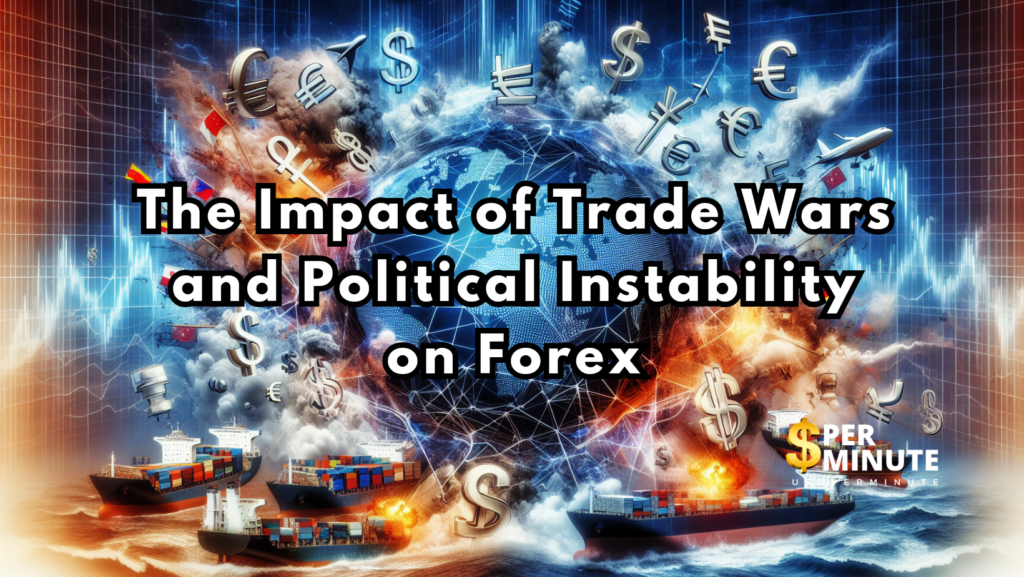The Impact of Trade Wars and Political Instability on Forex

The forex market, the world’s largest and most liquid financial market, is highly sensitive to global events. Among the most significant factors that influence currency values are trade wars and political instability. These elements can create volatility, shift trends, and impact the economic fundamentals underlying currency values. This article examines how trade wars and political instability affect the forex market and what traders can do to navigate these challenges.
1. Understanding Trade Wars
What are Trade Wars?
Trade wars occur when countries impose tariffs or other barriers on each other’s goods and services in retaliation to perceived unfair trade practices. The aim is often to protect domestic industries but can lead to significant economic consequences.
Key Effects on Forex:
- Currency Depreciation: A country involved in a trade war may see its currency weaken due to reduced international trade volumes and lower investor confidence.
- Increased Volatility: Trade war announcements, tariff impositions, or retaliatory measures often cause sharp and unpredictable movements in forex pairs.
- Shifts in Safe-Haven Currencies: Currencies like the US dollar (USD), Japanese yen (JPY), and Swiss franc (CHF) often see increased demand as traders seek stability during trade tensions.
Example:
During the US-China trade war (2018-2020), the Chinese yuan (CNY) weakened significantly against the US dollar as tariffs on Chinese exports dampened economic growth. Meanwhile, safe-haven currencies like the JPY saw appreciation due to increased demand from risk-averse investors.
2. Political Instability
What is Political Instability?
Political instability encompasses events like elections, coups, protests, policy changes, and geopolitical tensions. Such instability can disrupt economic policies, undermine investor confidence, and directly impact a country’s currency.
Key Effects on Forex:
- Capital Flight: Investors tend to pull out their capital from politically unstable regions, causing the local currency to depreciate.
- Risk Aversion: Traders often shift to safer currencies or assets during periods of political uncertainty, reducing liquidity in riskier currencies.
- Policy Uncertainty: Unclear or sudden policy changes, especially related to trade or monetary policy, can confuse markets and lead to erratic currency movements.
Example:
The 2016 Brexit referendum, where the UK voted to leave the European Union, caused the British pound (GBP) to plummet. Uncertainty about trade agreements and economic policy led to prolonged weakness in the currency.
3. Combined Effects of Trade Wars and Political Instability
Trade wars and political instability often intersect, amplifying their combined effects on forex markets. For example:
- Economic Slowdowns: Prolonged trade tensions can lead to recessions, further weakening currencies tied to export-heavy economies.
- Global Contagion: Political and trade instability in major economies can spill over into emerging markets, causing broader forex market disruptions.
- Investor Sentiment: Uncertainty stemming from both trade wars and political instability leads to heightened risk aversion, impacting global currency flows.
Case Study:
The Russia-Ukraine conflict in 2022 combined political instability with trade disruptions. Sanctions on Russia and energy supply concerns affected the Russian ruble (RUB) and the euro (EUR), leading to significant forex market volatility.
4. How Traders Can Respond
Stay Informed:
Traders should closely monitor news related to trade negotiations, political developments, and policy changes. Economic calendars and news platforms are essential tools.
Diversify Portfolios:
Holding a mix of currencies, including safe-haven options, can reduce risk during periods of heightened uncertainty.
Use Risk Management Tools:
Stop-loss orders, hedging strategies, and reduced leverage can help mitigate potential losses from unexpected market moves.
Focus on Safe-Haven Currencies:
In times of uncertainty, shifting investments to stable currencies like the JPY, CHF, or USD can preserve capital.
Combine Fundamental and Technical Analysis:
While fundamental analysis helps understand the broader implications of trade wars and political instability, technical analysis can identify entry and exit points in volatile markets.
5. Final Thoughts
Trade wars and political instability are two major disruptors in the forex market. While they can present significant challenges for traders, they also create opportunities for those who can anticipate and adapt to market changes. By staying informed, managing risk effectively, and using a diversified trading approach, forex traders can navigate these turbulent periods with greater confidence. Understanding the interplay between global events and currency movements is key to succeeding in the ever-dynamic forex market.